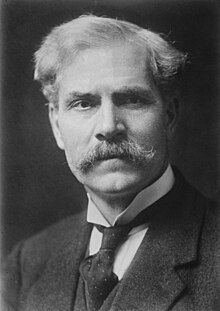Ramsay MacDonald
Ramsay MacDonald | |
|---|---|
 | |
| Prime Minister of the United Kingdom | |
| In office 5 June 1929 – 7 June 1935 | |
| Monarch | George V |
| Preceded by | Stanley Baldwin |
| Succeeded by | Stanley Baldwin |
| In office 22 January 1924 – 4 November 1924 | |
| Monarch | George V |
| Preceded by | Stanley Baldwin |
| Succeeded by | Stanley Baldwin |
| Leader of the Opposition | |
| In office 4 November 1924 – 5 June 1929 | |
| Monarch | George V |
| Prime Minister | Stanley Baldwin |
| Preceded by | Stanley Baldwin |
| Succeeded by | Stanley Baldwin |
| In office 21 November 1922 – 22 January 1924 | |
| Monarch | George V |
| Prime Minister | Bonar Law Stanley Baldwin |
| Preceded by | H. H. Asquith |
| Succeeded by | Stanley Baldwin |
| Leader of the Labour Party | |
| In office 22 November 1922 – 1 September 1931 | |
| Deputy | John Robert Clynes |
| Preceded by | John Robert Clynes |
| Succeeded by | Arthur Henderson |
| In office 6 February 1911 – 5 August 1914 | |
| Chief Whip | George Henry Roberts Arthur Henderson |
| Preceded by | George Barnes |
| Succeeded by | Arthur Henderson |
| Lord President of the Council | |
| In office 7 June 1935 – 28 May 1937 | |
| Prime Minister | Stanley Baldwin |
| Preceded by | Stanley Baldwin |
| Succeeded by | The Viscount Halifax |
| Leader of the House of Commons | |
| In office 5 June 1929 – 7 June 1935 | |
| Preceded by | Stanley Baldwin |
| Succeeded by | Stanley Baldwin |
| In office 22 January 1924 – 3 November 1924 | |
| Preceded by | Stanley Baldwin |
| Succeeded by | Stanley Baldwin |
| Secretary of State for Foreign Affairs | |
| In office 22 January 1924 – 3 November 1924 | |
| Preceded by | The Marquess Curzon |
| Succeeded by | Austen Chamberlain |
| Member of Parliament for the Combined Scottish Universities | |
| In office 31 January 1936 – 9 November 1937 | |
| Preceded by | Noel Skelton |
| Succeeded by | Sir John Anderson |
| Member of Parliament for Seaham | |
| In office 30 May 1929 – 14 November 1935 | |
| Preceded by | Sidney Webb |
| Succeeded by | Emanuel Shinwell |
| Member of Parliament for Aberavon | |
| In office 15 November 1922 – 30 May 1929 | |
| Preceded by | John Edwards |
| Succeeded by | William Cove |
| Member of Parliament for Leicester | |
| In office 8 February 1906 – 14 December 1918 | |
| Preceded by | John Rolleston Henry Broadhurst |
| Succeeded by | Constituency abolished |
| Personal details | |
| Born | James MacDonald Ramsay 12 October 1866 Lossiemouth, Morayshire, Scotland, UK |
| Died | 9 November 1937 (aged 71) Atlantic Ocean (on holiday aboard the ocean liner Reina del Pacifico) |
| Resting place | Spynie Cemetery, Morayshire |
| Nationality | British |
| Political party | Labour (until 1931) National Labour (from 1931) |
| Spouse(s) | |
| Children |
|
| Parents |
|
| Alma mater | Birkbeck, University of London |
| Profession | Politician |
| Signature | |
James Ramsay MacDonald FRS (né James McDonald Ramsay; 12 October 1866 – 9 November 1937) was a British politician and Prime Minister of the United Kingdom three times. He helped to build the Labour Party and became its first Prime Minister in 1924. His third period as Prime Minister was during the crisis of the Great Depression, when he formed a "National Government" in which a majority of MPs were from the British Conservative Party. He was expelled from the Labour Party.
MacDonald was an illegitimate child. He was born in Lossiemouth, Scotland. He graduated from elementary school and then high school.
Later he worked as a teacher for some time in his high school. In 1885, MacDonald became a member of the Social Democratic Federation.
In 1886, he moved to London, where he became an accountant. On November 13, 1887, MacDonald witnessed Bloody Sunday, after which he published a pamphlet. For some time, MacDonald was also interested in Scottish politics among Scots in London and spoke in support of Scotland for Scotland. At the same time, MacDonald received an evening education at the Birkbeck Literary and Scientific Institution, but shortly before the exams he had to give up his education due to nervous exhaustion.
As Prime Minister
[change | change source]The main achievement of the first MacDonald government was the realization by the British that Labour did not intend to carry out radical changes, but was ready to act for the common good. At the same time, due to lack of public support and a lack of seats in the House of Commons, Labour had not been able to do much of what it had said it would do - in particular, there was no widespread nationalization and community service.
- Prime Ministers of the United Kingdom
- 1866 births
- 1937 deaths
- Members of the British House of Commons for Scottish constituencies
- UK MPs 1906–1910
- UK MPs 1910
- UK MPs 1910–1918
- UK MPs 1922–1923
- UK MPs 1923–1924
- UK MPs 1924–1929
- UK MPs 1929–1931
- UK MPs 1931–1935
- UK MPs 1935–1945
- Labour Party (UK) MPs
- People from Moray
